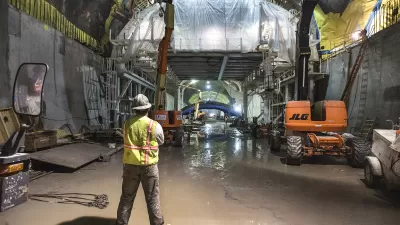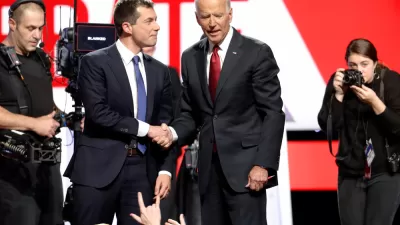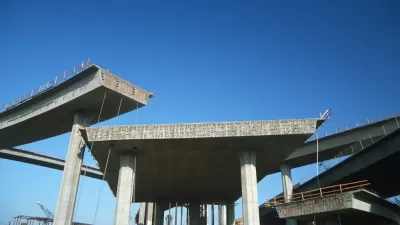The RAISE grant program continues to make history as a distinct departure from U.S. transportation planning tradition.

The U.S. Department of Transportation recently announced a Notice of Funding Opportunity for the 2022 RAISE grants, officially leaving the competitive grant program's predecessor programs in the dustbin of history.
The U.S. Department of Transportation on January 28 published a Notice of Funding Opportunity (NOFO) for the RAISE grant program—the Biden administration's grant program to fund small transportation infrastructure projects—picking up where the Obama administration's TIGER grants and the Trump administration's BUILD grants left off.
Yonah Freemark, a senior research associate at the Urban Institute, amplified the news of the NOFO on Twitter, highlighting grant selection criteria that prioritize projects that reduce pollution, reduce transportation and housing cost burdens, improve access for underserved communities, and ensure collaborations with non-transportation entities.
In November, Freemark was first to report the news of the 2021 funding allotment while also providing analysis of the grant program's potential to discard the auto-centric status quo of traditional U.S. DOT funding programs.
Applications for 2022 RAISE grant funding must be submitted by 5:00 PM Eastern on April 14, 2022.
FULL STORY: RAISE Grants Notice of Funding Opportunity

Study: Maui’s Plan to Convert Vacation Rentals to Long-Term Housing Could Cause Nearly $1 Billion Economic Loss
The plan would reduce visitor accommodation by 25,% resulting in 1,900 jobs lost.

North Texas Transit Leaders Tout Benefits of TOD for Growing Region
At a summit focused on transit-oriented development, policymakers discussed how North Texas’ expanded light rail system can serve as a tool for economic growth.

Why Should We Subsidize Public Transportation?
Many public transit agencies face financial stress due to rising costs, declining fare revenue, and declining subsidies. Transit advocates must provide a strong business case for increasing public transit funding.

How to Make US Trains Faster
Changes to boarding platforms and a switch to electric trains could improve U.S. passenger rail service without the added cost of high-speed rail.

Columbia’s Revitalized ‘Loop’ Is a Hub for Local Entrepreneurs
A focus on small businesses is helping a commercial corridor in Columbia, Missouri thrive.

Invasive Insect Threatens Minnesota’s Ash Forests
The Emerald Ash Borer is a rapidly spreading invasive pest threatening Minnesota’s ash trees, and homeowners are encouraged to plant diverse replacement species, avoid moving ash firewood, and monitor for signs of infestation.
Urban Design for Planners 1: Software Tools
This six-course series explores essential urban design concepts using open source software and equips planners with the tools they need to participate fully in the urban design process.
Planning for Universal Design
Learn the tools for implementing Universal Design in planning regulations.
City of Santa Clarita
Ascent Environmental
Institute for Housing and Urban Development Studies (IHS)
City of Grandview
Harvard GSD Executive Education
Toledo-Lucas County Plan Commissions
Salt Lake City
NYU Wagner Graduate School of Public Service





























